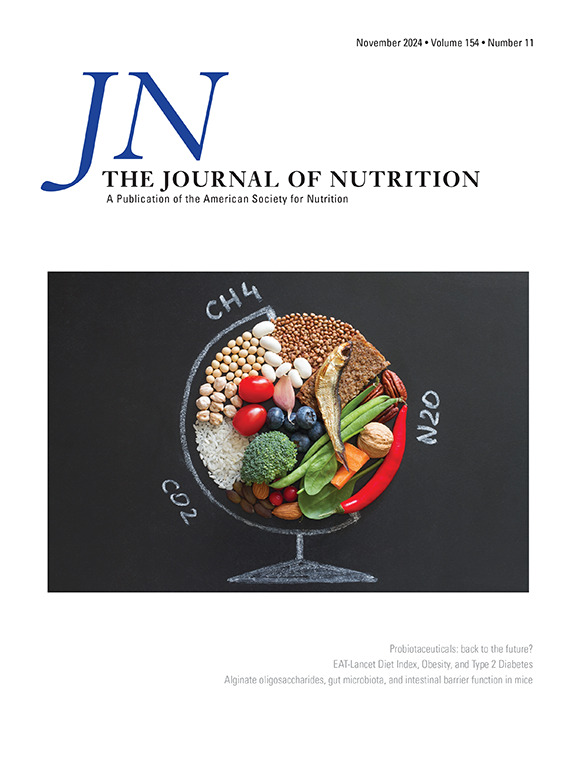An Examination into the Effects of a Saffron Extract (Affron) on Mood and General Wellbeing in Adults Experiencing Low Mood: A Randomized, Double-Blind, Placebo-Controlled Trial
IF 3.8
3区 医学
Q2 NUTRITION & DIETETICS
引用次数: 0
Abstract
Background
Saffron, derived from the stigmas of the Crocus sativus flower, has been shown in previous trials to have antidepressant effects in clinically diagnosed adults. However, the recruitment of small sample sizes, short treatment periods, and variability in the quality of studies have negatively impacted the strength of conclusions.
Objectives
The purpose of this 2-arm, 12-wk, parallel-group, randomized, double-blind, placebo-controlled trial was to examine the effects of supplementation with a saffron extract (Affron) on mood and sleep in adults experiencing subclinical depressive symptoms.
Methods
Two hundred and two adults aged 18–70 with depressive symptoms were supplemented with 28 mg saffron daily or a placebo. Outcome measures included the Depression, Anxiety, and Stress Scale – 21, Sleep Disturbance and Sleep-Related Impairment Scale, World Health Organization–Five Well-Being Scale, and daily depression, stress, and anxiety ratings.
Results
On the primary outcome measure, compared to the placebo, saffron was associated with greater improvements in the Depression, Anxiety, and Stress scale – 21 depression score (β: –2.92 points; 95% confidence interval: –5.13, –0.71 points; Cohen’s d = 0.39), with 72.3% of participants in the saffron group achieving a clinically significant change (a reduction of ≥ 7 points) compared to 54.3% of participants in the placebo group (P = 0.010). However, in the other secondary outcomes, there was no evidence of between-group differences. In exploratory analyses across various strata and assumptions, improvements in sleep disturbances (β: –2.72 points; 95% confidence interval: –4.99, –0.46 points; Cohen’s d = 0.44) were identified in a subset of participants with a greater severity of sleep disturbance. There were no serious adverse reactions reported.
Conclusions
This study, the largest conducted to date on saffron, provides evidence supporting the beneficial effects of 3 mo of saffron supplementation on depressive symptoms in adults. Large placebo responses were evident in this study, which require consideration in future trials.
This trial was registered at Australian and New Zealand clinical trials registry as ACTRN12623001358639.
研究藏红花提取物(affron®)对情绪低落的成年人的情绪和一般健康的影响:一项随机、双盲、安慰剂对照试验。
背景:从藏红花花的柱头中提取的藏红花,在先前的试验中已被证明对临床诊断的成年人具有抗抑郁作用。然而,样本量小、治疗时间短以及研究质量的可变性对结论的强度产生了负面影响。目的:这项为期12周,平行组,随机,双盲,安慰剂对照试验的目的是检查补充藏红花提取物(affron®)对患有亚临床抑郁症状的成年人的情绪和睡眠的影响。方法:222名年龄在18岁至70岁之间有抑郁症状的成年人每天补充28毫克藏红花或安慰剂。结果测量包括抑郁、焦虑和压力量表-21 (DASS-21)、睡眠障碍和睡眠相关障碍量表、WHO-5健康量表以及每日抑郁、压力和焦虑评分。结果:在主要结局测量中,与安慰剂相比,藏红花与DASS-21抑郁评分的更大改善相关(β=-2.92分,95% CI: -5.13至-0.71分;Cohen’s d=0.39),与安慰剂组54.3%的参与者相比,藏红花组72.3%的参与者实现了临床显著的变化(减少≥7分)。然而,在其他次要结果中,没有证据表明组间存在差异。在不同层次和假设的探索性分析中,睡眠障碍的改善(β=-2.72点,95% CI: -4.99至-0.46点;Cohen’s d=0.44)在睡眠障碍更严重的一部分参与者中被识别出来。未见严重不良反应报告。结论:这项研究是迄今为止对藏红花进行的最大的研究,提供了证据支持三个月的藏红花补充剂对成年人抑郁症状的有益影响。在这项研究中,大量安慰剂反应是明显的,这需要在未来的试验中考虑。试验注册号:ANZCTR, ACTRN12623001358639。2023年12月21日注册,https://www.anzctr.org.au/ACTRN12623001358639.aspx。
本文章由计算机程序翻译,如有差异,请以英文原文为准。
求助全文
约1分钟内获得全文
求助全文
来源期刊

Journal of Nutrition
医学-营养学
CiteScore
7.60
自引率
4.80%
发文量
260
审稿时长
39 days
期刊介绍:
The Journal of Nutrition (JN/J Nutr) publishes peer-reviewed original research papers covering all aspects of experimental nutrition in humans and other animal species; special articles such as reviews and biographies of prominent nutrition scientists; and issues, opinions, and commentaries on controversial issues in nutrition. Supplements are frequently published to provide extended discussion of topics of special interest.
 求助内容:
求助内容: 应助结果提醒方式:
应助结果提醒方式:


